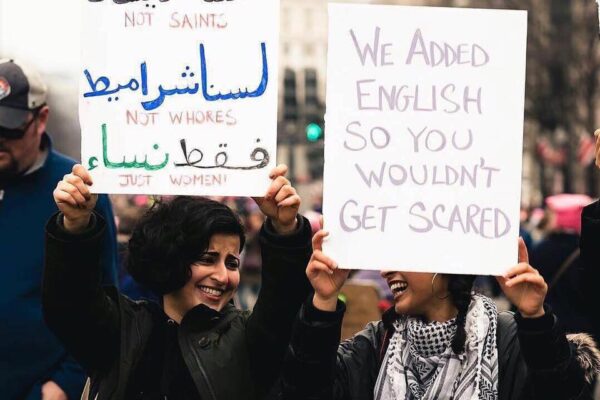This article originally appeared on Religion Dispatches.
Possibly this week, President Trump might sign yet another executive order, this time restricting entry to the United States from majority Muslim countries [read a draft obtained by HuffPo here]. This, on the heels of the executive orders he just signed to ramp up immigration enforcement and enable the building of the U.S.-Mexico border wall he promised during his campaign. Muslim and immigrant groups, especially youth, are mobilizing against these actions, with a major protest taking place last night in New York City’s Washington Square Park.
To combat the continued vilification of Islam in the American public sphere since September 11th, American Muslim houses of worship and organizations have worked against policies that visibly target Muslims such as profiling, denial of First Amendment rights and harassment by law enforcement. In doing so, these institutions work to gain public recognition, inclusion and representation, as well as the ability to help shape public policy.
This narrow focus on “Muslim issues” has indeed helped drum up support from a range of allies pledging to protect the American Muslim community, including the Anti-Defamation League, the ACLU, the Southern Poverty Law Center and public figures such as George Takei and Michael Moore. As the Trump era begins, it seems American Muslim institutions’ focus on self-preservation will persist but, unlike the post-9/11 era, this time it might mean increased disaffiliation from younger American Muslims seeking a broader range of political engagement.
Eman Hassaballa Aly is one of 469 Muslims who signed a Muslim letter to Donald Trump. She also participated in its drafting. Aly has extensive experience working for Muslim organizations and was raised in a family with close ties to the local mosque. But she also feels a growing sense of frustration with the Muslim community.
“I signed that letter because it’s a step forward,” Aly said. “But the letter just focuses on Muslim issues, and at this point, we don’t need to have 400 people sign one letter. We need 400 letters—you know what I mean? We are not one voice, we are not a monolith.”
Given the demographics of American Muslims, the most diverse faith community in the nation, it might seem natural for Muslim institutions to engage a broad cross-section of issues—from surveillance and immigration reform to climate change and criminal justice reform. Yet at the start of the Trump presidency, the majority of Muslims in the U.S. continue to interpret “Muslim issues” narrowly, from a security and First Amendment perspective. This narrow focus is increasingly frustrating to younger American Muslims whose participation in Muslim life is evolving in creative ways.
Specifically, many assumed that increased visibility and civic participation post-9/11 might also lead to Muslim Americans as a whole becoming more accepting of practices that differ from the dominant cultural norms within their communities—such as interracial or inter-religious marriage. Yet that has not been the case.
Through our research on religious creativity, the USC Center for Religion and Civic Culture has seen Los Angeles’ young Muslims create “third spaces” such as the Ehsan Center and the Women’s Mosque of America—spaces that operate outside the norm of what a traditional mosque looks like. Across the country, I have talked to young American Muslims who are disaffiliating entirely from formal institutions and participating in community-building in new ways. In the course of this work, I heard a common narrative: a desire for something that traditional mosques and other established Muslim institutions are not providing.
Tasbeeh Herwees, an L.A.-based staff writer at GOOD magazine, expressed frustration with what she called “Muslim respectability politics.”
“The way we talk about how Muslims will be targeted by surveillance, at points of entry, at our mosques, benign surveillance at the airport, fails to understand that there are black Muslim activists and groups who have been targeted tenfold in the same way,” she said. “The mainstream position fails to acknowledge these experiences.”
Herwees says that solidarity comes from both her belief system and the diversity of Muslims in America: “If we are advocating on behalf of Black Lives Matter, if we are advocating on behalf of Chicano rights, it is because it is closely tied to our enshrined principles—besides the fact that Muslims are black and are Chicano and are queer.”
At the root of this resistance to broader participation, according to many of my respondents, is the dominance of a small ethnic minority over a majority of institutions, the prevalence of male cultural hegemony, lack of capacity and resources, and lack of organizational structures that encourage diverse participation. These challenges are often discussed within Muslim communities, yet they continue to persist. And now, as American Muslims begin to interpret the boundaries of community in different ways, mainstream institutions’ resistance to change is likely to hurt their long-term viability. The upcoming generations of American Muslims are beginning to look elsewhere for ways to create community, both spiritually and politically.
Herwees recently joined a new group in Los Angeles called Horizontal Muslims, which she describes as an “activist group united by a desire to be active in other communities, to organize on behalf of other communities.” She said she appreciates the group’s diverse leadership, a contrast to the “board entirely made of middle-aged Arab men” at the mosque she used to attend.
Aly now runs Collaboryst, an organization that helps Muslim American professionals hone and market their skills while providing access to networks and opportunities. “I’ve kind of disengaged,” she said of her involvement in traditional institutions. “I’m doing my own thing.”
Part of her drift away from mainstream Muslim institutions has to do with her experience after the PULSE nightclub shooting in Orlando. Aly became very involved with the Trust Collective, an interfaith coalition trying to build partnerships between faith communities and the LGBTQ community. When she first became involved, there was some interest from others in the Muslim community.
“The last meeting I went to,” Aly said, “I was the only mainstream type of Muslim there. I come from your usual mosque-going community, but everyone else stopped showing up.”
A PRRI poll target=”_blank” showed that 42 percent of Muslim Americans approve of same-sex marriage. To many younger American Muslims, the benefits of allying with other marginalized groups on issues such as LGBTQ inclusion and immigration reform seem clear. But institutional Islam has not kept up.
Many Muslim American leaders, organizations and institutions are working to broaden the sphere of engagement.
Muslim American organizations such as MPower and mosques such as the Islamic Center at NYU have shifted away from participating in traditional Muslim institutions, instead opting to develop broader coalitions to tackle social issues. The question remains whether these attempts at broadening Muslim participation in the public sphere will succeed and alter the trend toward disaffiliation among younger Muslims.
The reality is that if Muslim American institutions do not do more to engage non-Muslim communities on a broader range of issues, there may not be many Muslims willing to fill the country’s mosques by the time the Trump presidency ends.
Photo from Twitter user @ostadjaan.
Hebah Farrag was the assistant director of research of the USC Center for Religion and Civic Culture through 2023.





